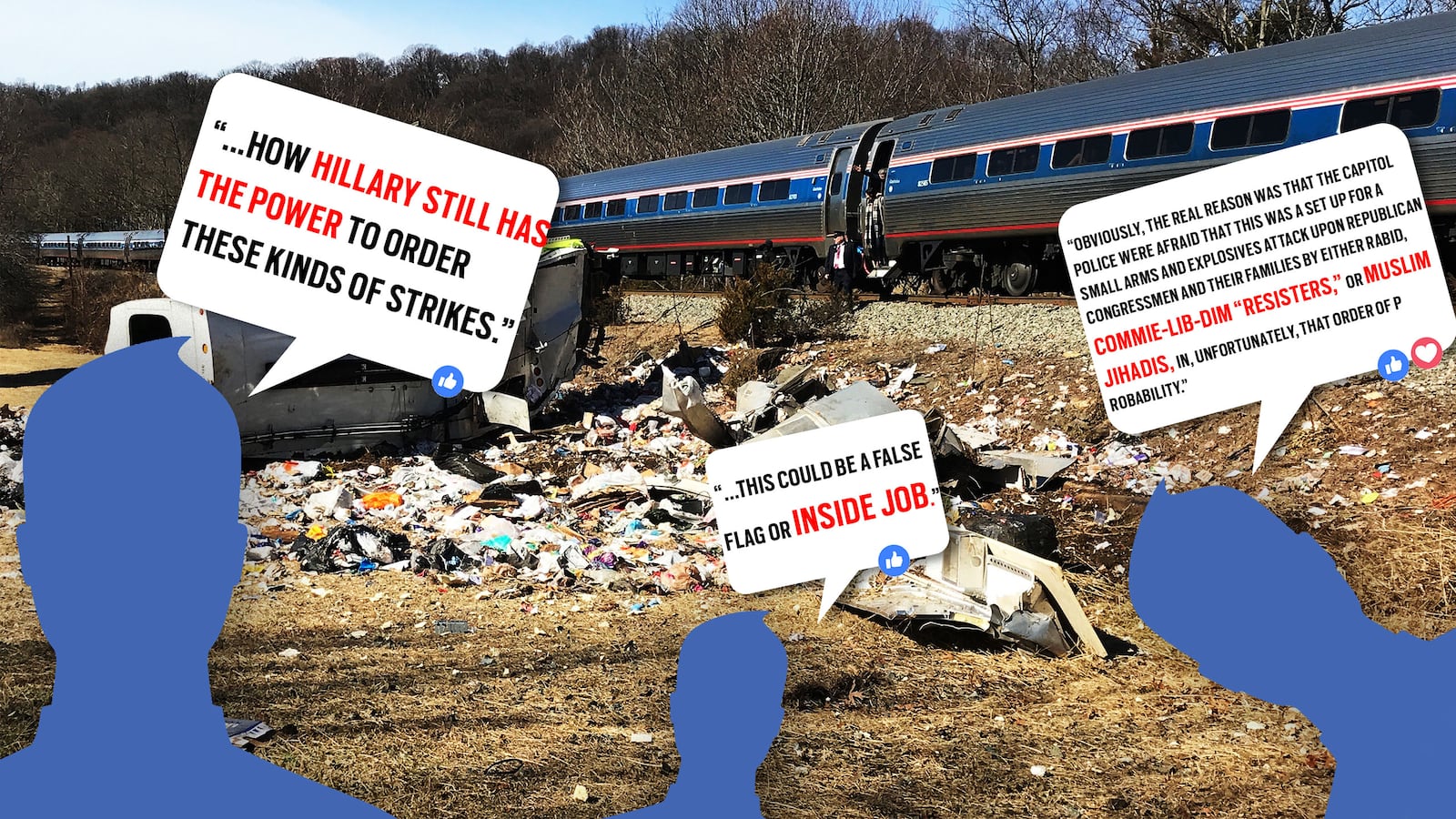The “People Are Saying” section of Facebook’s curated Trending News feature prominently surfaced several conspiracy theories about Wednesday’s Amtrak crash pushed by personal accounts, alleging a “false flag” attack by “commie-lib resisters” or Hillary Clinton herself.
For users logged out of Facebook, “People Are Saying” is the only section that surfaces on the topic page for the Amtrak crash in Charlottesville that left one dead and two others injured.
The train was carrying Republican members of Congress heading to a retreat. The one death and two serious injuries were reportedly sustained by the people in a truck hit by the oncoming train.
The top posts in “People Are Saying” are mostly written by people who are not public figures but who have shared posts by reputable news organizations.
“I want to know if Rep. Devin Nunes was on this train and how Hillary still has the power to order these kinds of strikes,” reads one post, affixed to an ABC News story.
Another post, linking to a Daily Caller article, claims it knows the “real reason Capitol Police… would not let any (legislators) get off of the train,” referring to a deeper conspiracy theory not listed in the linked article.
“This was a set up for a small arms and explosives attack upon Republican Congressmen and their families by either rabid, Commie-Lib-Dim ‘resisters,’ or Muslim jihadis, in, unfortunately, that order of probability,” wrote that user, whose post has 12 shares and 55 comments.
In a statement, a Facebook spokesperson said the company will work to prevent that kind of user experience in the future.
“Trending includes a separate section of people’s individual posts related to the news event; it’s essentially a comments section. We built this as a way for you to easily see what others are saying around a topic,” said a Facebook spokesperson. “The type of stuff we’re seeing today is a bad experience and we’re going to work to fix the product.”
The social network has continually struggled to keep disinformation and conspiracy theories off of its platform, often in emergency situations.
In October, Facebook’s “Safety Check” feature, which was created to notify friends and family of a user’s safety after an emergency situation, pushed websites like “TheAntiMedia” and “RedNewsHere” instead of traditional news sources.
Some of those websites solicited bitcoin handouts on the Safety Check page, others sold bumper stickers, and one linked to “Funny Videos” in the hours after the Las Vegas massacre. Conspiracy theories proliferated about the Vegas shooter’s political motives on the Safety Check page.
After the debacle, a Facebook spokesperson promised that the service was “working to fix the issue,” and the page leaned more heavily on reputable news outlets hours later.
The same procedure does not appear to be in place for Facebook’s Trending News section.
Far-right conspiracy sites InfoWars and Gateway Pundit, who framed three innocent people for terror attacks last year based on posts from 4chan, Reddit and anonymous Twitter accounts, started pushing similar Amtrak-related conspiracies on Wednesday afternoon.
The last two years have been tumultuous for Facebook’s public image, after the social media giant initially denied its role in disseminating disinformation and propaganda from authoritarian governments interfering in democracies across the world—including in the 2016 U.S. elections—before reversing course after pressure from users and the U.S. government.
On Jan. 4, CEO Mark Zuckerberg said “protecting our community from abuse and hate, defending against interference by nation states, or making sure that time spent on Facebook is time well spent” would be his New Year’s resolution.
“We won’t prevent all mistakes or abuse, but we currently make too many errors enforcing our policies and preventing misuse of our tools. If we’re successful this year then we’ll end 2018 on a much better trajectory,” he said.
Earlier this month, Facebook promised to focus more on what friends and family members share in an effort to “refocus our system,” which may point to the prominence of personal accounts on breaking news event pages like “People Are Saying.” The section’s “People Are Saying” heading might be familiar to those who closely followed the 2016 presidential campaign. Then-candidate Donald Trump frequently used the phrase “some people are saying” to “spread conspiracies and innuendos,” according to The Washington Post.
Trump claimed at a New Hampshire rally, for example, that “people are saying that” President Obama was not American, in response to a man in the audience.
Meanwhile, on Monday, Zuckerberg promised “a series of updates to show more high quality, trusted news,” with a focus on surfacing more local news.
This post was updated to include comment from Facebook.






